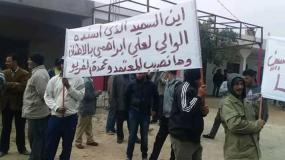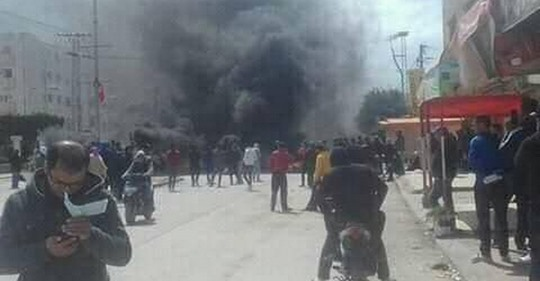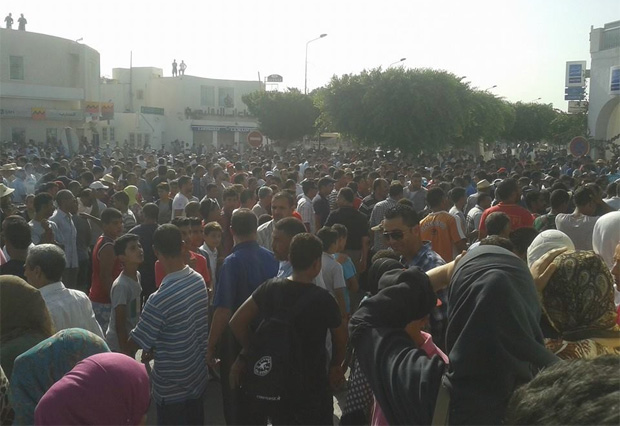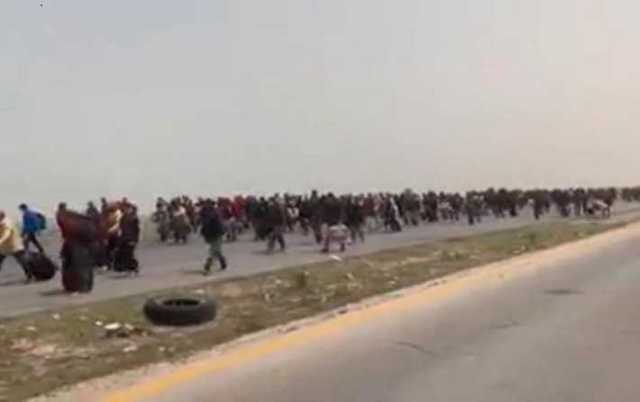
The
beginning of the so-called Covid-19 crisis in Tunisia coincided with
the end of the institutional impasse
to form the new government (after about 4 months of consultations).
The internal contradictions of the Tunisian bureaucratic bourgeoisie
gave birth to an even more heterogeneous government than the previous
one, this is normal since the high fragmentation of the political
composition following the last parliamentary elections. Today, the
two-faced Janus represented by political Islam / authoritarian
secularism, in power since 2015 but recently weakened by the result
of the last elections, has also been implanted by the social
democratic reformist left.
The
political nature of the current Tunisian government
These
two main trends previously had their own monolithic parliamentary
representatives, but now they are fragmented: although Ennahdha
is formally the only force of political Islam in government, but in
the opposition there is a new entry that comes from the same furrow,
the Karama party with which there is often unity of understanding
between the two.
The
same goes for secularist-conservative forces (often referred to as
"secular" in western countries) which have undergone
greater downsizing (Tahya
Tounes, Nidaa
Tounes, The
Tunisian Alternative and Machrou
Tounes together
count 24 deputies), the nostalgic of the former dictator Ben Ali of
the PDL count less than 20 deputies, finally the parties of the
reformist left and the Nasserian "nationalists" are
represented by the Democratic Current and the Movement of the People
(together in the Democratic Bloc parliamentary group become the
second parliamentary group after Ennahdha).
The
internal contradictions of the Tunisian bourgeoisie expressed by
these parties and the mediation represented by President of the
Republic Kais Saied’s action, has shuffled the cards within these 3
major political trends of the country.
Kais
Saied, in fact, despite being a president not belonging to any
parties, after Ennahdha's
first failed attempt to form the government (which he was entitled
to), he acted skillfully following his own principles hostile to the
old regime representatives and exploiting his institutional
prerogatives.
He
therefore denied the possibility of trying to form the government to
the second party in parliament, Qalb
Tounes (creature of
the telecommunications mafia magnate Nabil Karoui) and instead
entrusted the task to the current Prime Minister Elyes Fakhfakh,
exponent of the social democratic and extra-parliamentary party
Ettakatol
(Democratic Forum for Work and Freedoms) placing it as the needle of
the balance of these internal contradictions and giving life to the
"Fakhfakh creature".
A
government of national unity with the majority of ministerial
portfolios assigned to "technicians" and the rest entrusted
in order to representatives of Ennahdha,
People's Movement, Democratic Current, Tahya
Tounes, Nidaa
Tounes and Tunisian
Alternative. A government supported by almost the entire
parliamentary arch except for three parties (Karama,
Qalb Tounes
and PDL).
A
government with an anti-national nature that continues to represent
the interests of the Tunisian bureaucratic and comprador bourgeoisie
in its various factions linked to Western imperialism (France, Italy,
USA) and open to reactionary powers in the Middle East (the Turkey /
Qatar axis, but also United Arab Emirates and Saudi Arabia).
It
is this government that since the first day of its establishment in
late February has measured itself with the pandemic confirming once
again like the previous governments to following the trend of foreign
debt (and therefore of foreign dependence) by accepting loans from
Italy, so-called aid from the EU (€ 850 million), the US ($ 600
thousand), as well as from China, a new loan from the IMF (€ 545.2
million), the Islamic Development Bank ($ 279 million), the African
Development Bank. In particular, this new IMF loan has the same
constraints as the previous ones which impose a deregulation of the
national economy with liberalizations, cuts in public spending,
weakening the welfare state already at the limit in a country like
Tunisia.
So
no illusions about this government, who, among the intellectuals and
activists of the reformist left, thinks that "the Fakhfakh
government cannot afford to make mistakes" and expresses itself
in these terms, reveals its ideological-political confusion.

Who
is paying for the crisis in Tunisia?
Tunisia
has a public debt that exceeds 75% of its GDP, this is a direct
consequence of the foreign debt
vicious circle that increasingly ties the country to a neo-colonial condition since 1956 (the year of formal independence). The official average unemployment rate is 15% with peaks of 35% among young people (representing a good portion of the population) and the poverty rate is 30%.
vicious circle that increasingly ties the country to a neo-colonial condition since 1956 (the year of formal independence). The official average unemployment rate is 15% with peaks of 35% among young people (representing a good portion of the population) and the poverty rate is 30%.
In
addition, more than 50% of GDP is made up of the underground economy
which allows hundreds of thousands of officially unemployed people to
survive.
This
economic dependence on imperialism pursued by the rulers is the cause
of this economic / social framework which is worsening more and more
with the daily attack on the already precarious living conditions of
the popular masses. This context worsened with the outbreak of the
Covid-19 crisis in March.
This
was clear from the economic policy measures launched ad
hoc
in the two months of March-April:
from
the 2,500 million Tunisian dinars (€ 800 million), allocated by the
government, only 450 million td are destined for workers and the poor
while all the rest is for the benefit of the masters who are granted
subsidies, tax relief and bank and financial facilities. In addition,
the tens and tens of thousands of workers who work illegally will not
benefit from these incentives and many of them have already been put
at the door by the companies they work for which closure was imposed
following the latest decree against the pandemic. But two measures in
favor of companies deserve further investigation:
The
suspension of the procedures for "tax crimes": another
great gift that the post-revolt Tunisian regime makes to the great
businessmen colluded with the former Ben Ali regime, recently
rehabilitated with a sort of "national reconciliation"
promoted by the late president Essebsi and severely challenged by a
movement that arose for this occasion Manich
Msemah
(I do not forgive).
A
further gift is instead addressed to totally exporting companies,
often foreign ones, who already enjoying enormous benefits
(non-payment of taxes for the first 10 years, contributions of up to
50% from the government on workers' wages, possibility of importing
machinery without paying customs, possibility to export 100% of the
profits etc.) will find themselves in a highly competitive position
with respect to the national producers producing the same goods.
There
were also speculators, immediately active in defrauding the prices of
basic necessities (flour, semolina, garlic, eggs and milk) that the
government said it wanted to counter, to which were added episodes of
institutional corruption that have invested in full government itself
...
the
most striking case concerns the minister of industry Ben Youssef who,
overcoming the law, ordered a command of thousands of masks on behalf
of the government from a parliamentary and industrial deputy. During
his press conference on April 19, Prime Minister Fakhfkh minimized
the incident by taking the defense of the minister.

It
must be added that at the end of April the government proceeded with
measures aimed at targeting public sector workers (who represent a
large part of the official work evidently) by attacking their
purchasing power by taking forced withdrawals from wages to support
the crisis, announcing the non-payment of overtime job already done
and so on.
On
April 28, Faycel Derbel, a former economic adviser to the government,
suggested to "lightening the mass salary of the civil service",
specifying that this does not mean "reducing civil service
‘salary", but evidently means new firings, perfectly in line
with what preaches for some years the IMF to the leaders of the
country.
The
ruling political class and its lackeys are therefore using Covid-19
to return to the main road of the structural reform program which had
been hampered last year by two large general public strikes (with
participations of over 90%) who claimed the opposite: job protection
and the economic rights of the "wage bill". This had
created quite a few frictions between the previous government and the
IMF, given that the former had been forced by the strike to
renegotiate some conditions with the imperialist financial agency
such as the granting of career shots and wage increases.
What
is the response of the Tunisian popular masses?
In
the face of this crisis management, a heterogeneous and jeopardize
spontaneous resistance is underway: more radical protests have
occurred in the rebel region of Kasserine, with spontaneous
proletarian expropriations from the trucks of flour and semolina
which also occurred in Meknassi (region of Sidi Bouzid) to which were
added demonstrations in front of the buildings of power to demand the
restoration of the supply of these basic necessities. In Kasserine, a
member of parliament from the region and owner of a mill and
warehouses who has been speculating on these assets for years has
been charged.
Instead,
in the capital proletarian suburbs (Mnhilla and Ettadhamen) hundreds
of people, after not finding the subsidies from the government, not
finding them at the bank counters, made roadblocks clashing with the
police. As of this writing, a month later, other roadblocks are
underway in the Susa region for the same reason, as the second
tranche of the subsidy has not yet been paid. Similar demonstrations
also occurred in the agricultural region of Siliana.
In
Djerba island the situation has been tense for at least 15 days, in
fact after being declared an outbreak area, access to the island was
closed (ferries stopped and the ancient Roman bridge closed) about
3,000 workers from other regions found stuck there, jobless with the
closure of all activities. After weeks of promises, the government
finally began the gradual evacuation to quarantine sites and then
allowed everyone to return home, but this only happened after clashes
with the police occurred several times when the exasperated people
tried to break through the safety cords and to cross the Roman bridge
to reach the mainland.
A
similar situation has affected hundreds of Tunisians who have been
stranded on the border in Libya. After days of exhausting waiting,
with the complacency of the Libyan border authority (Berber militias
loyal to Serraji who have other concerns with the arrival by the
Haftar militias at only 15 Km ...), they broke through the border
returning to their country without finding resistance not even from
the Tunisian border authorities.
The
doctors and nurses, brought up more and more instrumentally by the
rulers of all the countries, in mid-March at the hospital in Sfax
harshly contested the visiting health minister. A minister widely
criticized by many for his evident incompetence in managing the
health crisis and accused of being engaged mainly in propaganda
tours.
The
students and university professors’ unions instead boycotted the
proposal of the ministry of higher education for distance teaching
that would discriminate most of the students, given the conditions of
the country, and denounced how such a proposal is the fig leaf to
favor private telephone companies or foreign manufacturers such as
Huawei.
Despite
the growing unpopularity of the mentioned ministers, Fakhfakh has
pursued the survival of his government as his first objective, not
wanting to disturb the fragile internal balance, in this sense he has
given in to the advances of Ennahdha
that, after a low profile debut in the government, being the majority
party, now is asking more: in the midst of many controversies
Fakhfakh appointed two further political advisors a few days ago for
the presidency of the Council of Ministers coming from the Islamist
party.

Continuing
to follow the Italian government crise timing agenda, also Tunisia,
yielding to pressure from the UTICA patronal organization, will
disorderly reopen many activities regardless of the negative health
effects in contrast to the opinion of doctors and virologists.
In
this context, the parliamentary opposition, excluding the
reactionaries, is practically non-existent. The parties of the
revisionist left, Popular Front and Workers' Party, outside
parliament are practically inactive, leaving their militant base,
composed mainly of young people, without political indications and in
disarray (or better to say "leaving them at home").
Currently
the single union UGTT is the only structured social force that can
potentially act as a barrier against these policies, however,
considering that for decades it has been an internal force in the
power paradigm with a strategic aim tending more to conciliation than
to breaking with power itself, this it was clear during the great
miners' revolt of Gafsa in 2008 and in the same popular uprising of
2010/2011. In the current phase, it has limited itself only to formal
stances respecting the ban on strike (among other things formally in
force since 2015 with the establishment of the "state of
emergency" recently extended until June).
However,
a part of the revolutionary forces has found an organizational form,
also managing to involve a part of the basic militants of the
revisionist parties, creating a sort of frontal organization called
the Popular Solidarity Initiative Network. This organization has
started a national campaign in which at the same time it materially
supports the popular sectors most affected by the crisis, informs
about health conditions and denounces government policies. The "left"
of this organization, composed of Maoist communists active in the
network, consider it as a United Front activity suited to the
concrete situation and objectively direct its activity, other
comrades from the same area instead do not participate and criticize
it considering this experience as a form of "charitable
bourgeois propaganda".
What
is certain is the need to fully grasp the challenge launched by the
counterpart and intensify the struggle for the construction of the
Communist Party suited to current conditions and the country in the
service of the class struggle that is currently developing and for
the Revolution of New Democracy

No comments:
Post a Comment